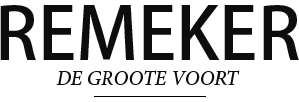Raw milk: the key to success!
Remeker cheese is made from raw, unprocessed milk.
Starter culture and organic rennet are the only further ingredients in this cheese-making process, so typical of the ‘Gouda’ cheeses.
And, by the way, we’re really picky about the rennet we use. In fact, we’re the only Dutch firm that buys the high-quality organic rennet produced by Hundsbichler in Austria.
The thick ‘pudding’ that results from adding starter and rennet is roughly cut with long knives so that fluid (whey) separates from the curd.
This curd is then washed with fresh water, transferred to the typically round cheese moulds and pressed so that the curd is compacted.
The next step is a bath of brine made from unprocessed Guérande sea salt.
The cheese is then rubbed in with our own ghee, pure milk fat made from our whey, before going to the ripening warehouse.
Salt
Very little salt is added to the cheese, which stays less than two days in the brine bath.
Such a short brining in sea salt has the effect that the cheese becomes tastier as it matures.
Jersey milk contains a broad range of minerals that make such a short brine bath possible.
Even with these extra minerals, Remeker cheese contains only some 1.8% (dry weight) of salt, which makes it perfectly acceptable for low-salt diets.
Ripening washed rind cheese
After brining, the wheels of cheese are placed on wooden shelves in the ripening warehouse, where the ideal climate we’ve created starts to do its work.
The cheese is rubbed on several more occasions with our ghee, both to prevent the rind from drying out and to restrict the growth of unwelcome moulds.
Within a few weeks, the cheese is covered with a perfect white mould culture.
The various moulds involved come from the environment in which our cows live. During milking, too, they can find their way from the teat to the milk and so into the cheese.
The moulds nourish themselves for a while on whey and brine on the rind, and in doing so create enzymes that in turn break down some of the ghee into a broad spectrum of aromatics.
In the course of time the whole cheese gets saturated in these aromatics, which are later the source of surprising and delicious ‘taste explosions’ when the cheese is eaten.
During the ripening period, fats and proteins in the milk are slowly transformed by bacteria and enzymes so as to create the characteristic taste of the cheese.
Cheese is a living product!
Natural
Our way of working, where the key to the whole production chain is ‘natural’, is ultimately responsible for the taste of Remeker cheese.
Above all, it’s a matter of leaving out.
What we at De Groote Voort especially leave out are artificial fertilisers, pesticides, dehorning, worming, pumping *, antibiotics, synthetic vitamins, food concentrates, pasteurisation, homogenisation, skimming, bactofugation, thermisation, calcium chloride, nitric acid and (industrial) refined salt.
That’s what we do to give the milk the chance to prove just how delicious real milk really is!
Unfortunately, it is forbidden to sell raw milk, but we are allowed to sell raw milk cheese!
And that is what Remeker cheese is!
* To avoid damaging the fat globules in the milk, we have designed special systems to minimise using pumps to transfer milk.
Research into raw milk
Prof. Ton Baars is a Dutch scientist, based in Germany, who carries out research into (raw) milk, health and safety.
See Ton in this clip and visit this site for more about his work on raw milk.
